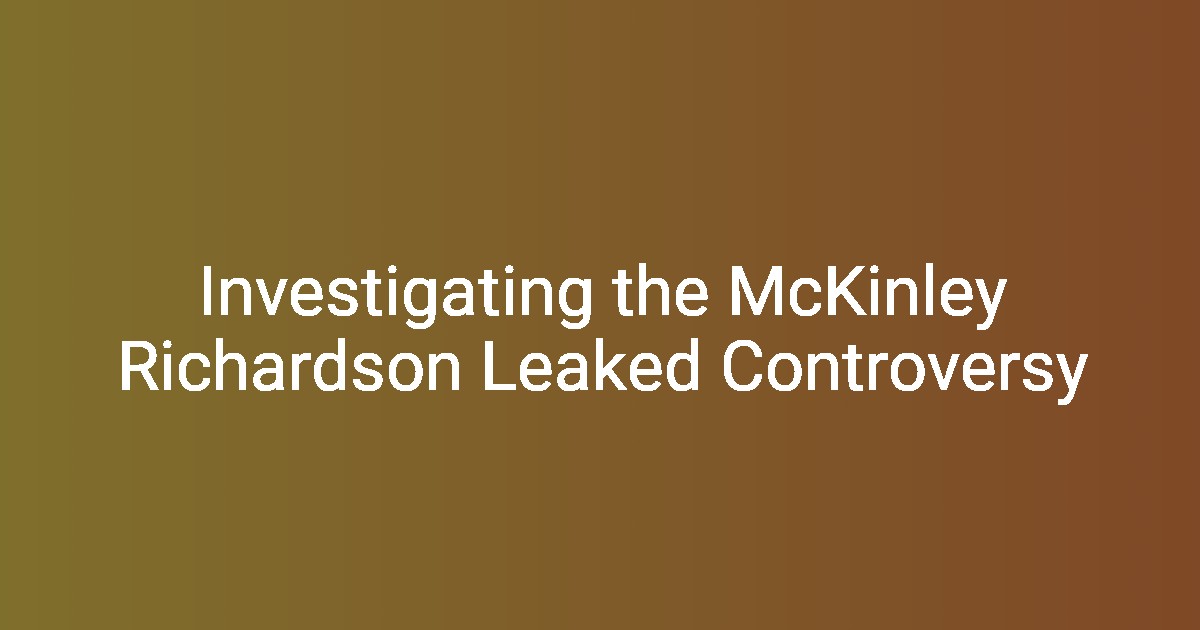Hey there, folks! So, you've probably heard whispers about "McKinley leaked" floating around the internet. It's been making waves, sparking curiosity, and leaving people scratching their heads. If you're wondering what all the fuss is about, you're in the right place. We're diving deep into this topic, breaking it down in a way that's easy to digest and packed with valuable insights. Whether you're a casual observer or someone who loves to stay in the know, this article's got you covered.
Now, let's get one thing straight—when we say "McKinley leaked," we're not just throwing out buzzwords. This phrase has a story behind it, and understanding its origins can help you make sense of the chaos. Think of it as a puzzle, and we're here to help you piece it together. Stick with us, and you'll walk away with a clearer picture of what's really going on.
Before we dive into the nitty-gritty, let's address the elephant in the room. Why should you care about McKinley leaked? Well, in today's digital age, information spreads faster than ever. Staying informed isn't just about keeping up with trends—it's about understanding how these developments can impact your world. So, buckle up, because we're about to take you on a ride through the ins and outs of this phenomenon.
Read also:Piero Barones Wife The Untold Story Of Love Fame And Family Life
What Exactly is McKinley Leaked?
Alright, let's cut to the chase. McKinley leaked refers to the release of confidential or sensitive information related to McKinley—a name that could refer to a person, a project, or even an organization. Depending on the context, this could involve anything from personal data to corporate secrets. The term has gained traction online, sparking debates and raising questions about privacy, security, and accountability.
In simple terms, when something gets "leaked," it means it wasn't supposed to be out in the open. Think of it like someone accidentally spilling the beans—or, in this case, spilling a whole can of beans. The impact of such leaks can vary, but they often lead to significant consequences for those involved. Whether it's a breach of trust or a violation of privacy, the stakes are high, and people are paying attention.
Understanding the Context
Let's break it down further. To fully grasp the significance of McKinley leaked, we need to understand the context in which it occurred. Was it a deliberate act of whistleblowing, or was it an accidental slip-up? The circumstances surrounding the leak can shed light on its implications and the potential fallout.
- Deliberate Leaks: Sometimes, individuals or groups intentionally release information to expose wrongdoing or bring attention to an issue.
- Accidental Leaks: On the flip side, leaks can happen by mistake, often due to human error or security vulnerabilities.
- Impact on Stakeholders: Regardless of how it happened, the parties involved—whether they're individuals, businesses, or organizations—face the consequences of the leak.
Understanding these nuances is crucial because it helps us separate fact from fiction and avoid jumping to conclusions. In the world of information, context is king.
Why Should You Care About McKinley Leaked?
Here's the thing: whether you're directly affected by the leak or not, it's still relevant. In today's interconnected world, what happens to one person or entity can have ripple effects that touch many others. Think about it—data breaches, privacy violations, and ethical dilemmas are all part of the broader conversation about how we handle information in the digital age.
For instance, if the leak involves personal data, it raises concerns about how companies protect user information. If it's related to corporate secrets, it brings up questions about transparency and accountability. And if it's tied to a public figure, it highlights the challenges of maintaining privacy in a world where everything seems to be up for grabs.
Read also:Dive Into Denzel Washingtons Grandchildren Uncovering The Legacy
So, why should you care? Because the issues at play here—privacy, security, and ethics—affect us all. They're not just buzzwords; they're fundamental aspects of how we navigate the modern world.
Real-World Implications
Let's talk about the real-world implications of McKinley leaked. Depending on the nature of the leak, the consequences can range from mild inconveniences to major disruptions. Here are a few examples:
- Personal Impact: If the leak involves personal data, individuals may face identity theft, financial fraud, or other forms of exploitation.
- Corporate Impact: Companies dealing with leaks might suffer reputational damage, legal challenges, or financial losses.
- Social Impact: On a broader scale, leaks can spark public outrage, fuel debates, and even influence policy changes.
These scenarios highlight the far-reaching effects of leaks and why they deserve our attention. It's not just about the immediate aftermath; it's about the long-term implications and how they shape our world.
How Did It Happen?
Now, let's tackle the million-dollar question: how did McKinley leaked happen? To answer that, we need to delve into the mechanics of leaks and the factors that contribute to them. Whether it's a weak link in a security system or a disgruntled insider, leaks often stem from vulnerabilities that were overlooked or exploited.
In many cases, leaks occur because:
- Security Flaws: Systems with inadequate safeguards can be easily breached, leading to unauthorized access and data exposure.
- Human Error: Mistakes happen, and sometimes they result in sensitive information being shared unintentionally.
- Whistleblowing: Individuals who believe they're exposing wrongdoing may deliberately release information to bring attention to an issue.
Understanding the "how" is just as important as understanding the "what." It helps us identify potential weak points and take steps to prevent similar incidents in the future.
Preventing Future Leaks
So, what can be done to prevent leaks like McKinley leaked from happening again? The answer lies in a combination of technological solutions and human vigilance. Here are a few strategies:
- Strengthening Security Measures: Implementing robust encryption, firewalls, and access controls can help protect sensitive data.
- Training and Awareness: Educating employees and users about best practices for handling information can reduce the risk of accidental leaks.
- Whistleblower Protections: Establishing safe channels for reporting concerns can encourage transparency without compromising privacy.
By addressing these areas, we can create a more secure and trustworthy environment for handling information.
The Role of Technology
Technology plays a significant role in both facilitating and preventing leaks. On one hand, advancements in digital tools have made it easier to share and access information. On the other hand, they've also introduced new challenges and risks. Striking a balance between convenience and security is key to managing these dynamics.
For instance, cloud storage solutions offer unparalleled convenience but also pose potential security risks if not properly configured. Similarly, encryption technologies provide a layer of protection but can be complex to implement effectively. Navigating these trade-offs requires a thoughtful approach that considers both the benefits and drawbacks of technological innovations.
Emerging Trends in Data Security
As technology continues to evolve, so do the strategies for safeguarding information. Here are a few emerging trends in data security:
- Artificial Intelligence: AI-powered systems can detect and respond to potential threats in real-time, enhancing security protocols.
- Blockchain Technology: Blockchain offers a decentralized approach to data storage, making it more resistant to unauthorized access.
- Zero-Trust Architecture: This approach assumes that no user or device can be trusted by default, requiring continuous verification and validation.
These innovations hold promise for improving data security, but they also require careful implementation to avoid unintended consequences.
The Ethical Dilemma
Leaves like McKinley leaked often raise ethical questions that are difficult to answer. On one hand, leaks can expose wrongdoing and hold powerful entities accountable. On the other hand, they can violate privacy and cause harm to innocent individuals. Striking a balance between transparency and privacy is a complex challenge that requires thoughtful consideration.
For example, consider the case of whistleblowers who release information to expose corruption. While their actions may serve the greater good, they can also lead to unintended consequences for those involved. Similarly, accidental leaks may not be malicious in intent but can still cause significant harm. Navigating these ethical gray areas requires a nuanced understanding of the issues at stake.
Finding Common Ground
So, how do we find common ground in the debate over leaks? One approach is to focus on establishing clear guidelines and frameworks for handling sensitive information. By setting standards for transparency, accountability, and privacy, we can create a more balanced approach to managing leaks.
- Legal Frameworks: Establishing laws and regulations that address the complexities of leaks can help ensure fair treatment for all parties involved.
- Corporate Policies: Companies can implement policies that prioritize both transparency and privacy, striking a balance between these competing interests.
- Public Awareness: Educating the public about the implications of leaks can foster a more informed and engaged society.
By working together, we can create a system that respects both the need for transparency and the importance of privacy.
The Future of Information
As we look to the future, the landscape of information management is likely to continue evolving. Advances in technology, shifts in societal values, and changes in legal frameworks will all play a role in shaping how we handle sensitive data. Staying ahead of these trends requires a proactive approach and a willingness to adapt.
For instance, emerging technologies like quantum computing and advanced AI could revolutionize the way we store and protect information. At the same time, shifting attitudes toward privacy and transparency may influence how we approach issues like leaks and data breaches. Keeping an eye on these developments is essential for anyone interested in the future of information.
Preparing for What's Next
So, how can you prepare for the future of information? Here are a few tips:
- Stay Informed: Keep up with the latest trends and developments in technology and data security.
- Practice Good Habits: Adopt best practices for handling personal and sensitive information, both online and offline.
- Engage in the Conversation: Participate in discussions about privacy, transparency, and ethics to help shape the future of information management.
By taking these steps, you can position yourself to navigate the complexities of the digital age with confidence.
Conclusion
There you have it, folks—a deep dive into the world of McKinley leaked. From understanding the context to exploring the implications and potential solutions, we've covered a lot of ground. Whether you're concerned about privacy, security, or ethics, the issues surrounding leaks are relevant to us all.
As we move forward, it's important to remember that staying informed and engaged is key. By educating ourselves and participating in the conversation, we can help shape a future where information is handled responsibly and ethically.
So, what's next? We'd love to hear your thoughts and questions in the comments below. And if you found this article helpful, don't forget to share it with your friends and family. Together, we can make a difference in how we approach the challenges of the digital age.
References:
- Data Security Trends
- Ethical Dilemmas in Information Management
- Emerging Technologies in Data Protection
Table of Contents:
- What Exactly is McKinley Leaked?
- Why Should You Care About McKinley Leaked?
- How Did It Happen?
- The Role of Technology
- The Ethical Dilemma
- The Future of Information


